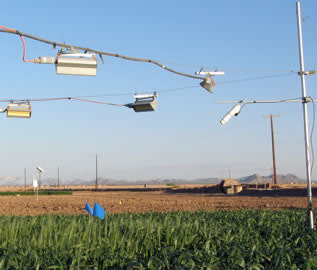|
This type of experiment applies a heating treatment to open-field plant canopies, simulating models of future warmer conditions. Dr. Bruce Kimball of the Arid-Land Agricultural Research Center and colleagues design and operate such experiments. In 2005 they developed a proportional–integrative–derivative control system for controlling the rise in temperatures. Apogee Infrared Radiometers provided the data on control and heated plot temperatures. Dr. Kimball and his colleagues have developed hexagonal arrays of infrared heaters that produce uniform warming across 3-meter-diameter plots. The degree of warming is maintained using the proportional-integrative-derivative control system for controlling the rise in temperatures. Apogee Infrared Radiometers (housed in a white PVC pipe radiation shield in the photo) sense the canopy temperatures of the heated plots as well as unheated reference plots which are used by dataloggers to modulate the output of the heaters. Similar infrared warming experimentation using this design and Apogee Infrared Radiometer sensors are also underway in Haibei, Qinghai, China; Cheyenne, WY; Ely and Cloquet, MN; Urbana, IL; Lexington, KY, and several other places around the world.
Image: Wheat warmed by infrared heaters is headed sooner in the "Hot Serial Cereal" experiment conducted by Dr. Bruce A. Kimball and colleagues at the USDA-ARS Arid-Land Agricultural Research Center and the University of Arizona at Maricopa, Arizona. |
|
30 November 2016
Temperature Free-Air Controlled Enhancement (T-FACE)
Subscribe to:
Post Comments (Atom)


No comments:
Post a Comment